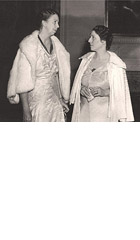
East Wind, West Wind 1993
Distributed by Filmakers Library, 124 East 40th Street, New York, NY 10016; 202-808-4980
Produced by Craig Davidson and Donn Rogosin
Directed by Craig Davidson
VHS, color and b&, 95 min.
Sr. High - Adult
Literature, Women's Studies, Asian Studies
Date Entered: 11/09/2018
Reviewed by Faye A. Chadwell, University of Oregon, Eugene, ORFans and scholars alike will appreciate East Wind, West Wind, Craig Davidson and Donn Rogosin's film documenting the amazing life of Pearl Sydenstricker Buck. A well-known and bestselling American woman writer, Buck spent her first 40 years in China, mostly in Nanking, and published her first novel, East Wind: West Wind in 1930. The daughter of Presbyterian missionaries, Buck lived among the Chinese peasantry, an experience that greatly influenced her writing and activism and eventually led to the publication of her Nobel Prize winning novel, The Good Earth. Buck was the first American woman to win a Nobel Prize.
The strengths of this West Virginia public television production, narrated by Eva Marie Saint, lie principally in Davidson and Rogosin's successful use of interview clips with Bucks family members and contemporaries, including her sister, Grace Yaukey, two adopted daughters, and author James Michener. Joining these commentators, several prominent East Asian scholars, like Chinese history professor John King Fairbank, contemplate and discuss Buck's position in American history and literature. Black and white film clips recording contemporary news events, (e.g. China’s Nationalist Revolution in 1926-27) add indispensable depth to the footage covering important events in Buck's life such as a visit to JFK's White House or the establishment of Welcome House, a non-profit agency dedicated to the care and adoption of Amer-Asian children. Despite Buck’s popularity, Davidson and Rogosin's film is not a Buck lovefest. Amidst the adulation for her lifelong advocacy in support of women¹s rights, civil rights, the repeal of the Chinese Exclusion Act, mixed race adoption, tolerance for the mentally retarded and even the anti-nuclear movement, critics provide a just appraisal of her literary talent; and both family and friends do not deny the moments of controversy sprinkled throughout Buck's life.
East Wind, West Wind is an engaging, well-edited, and balanced portrait of a fascinating American. Recommended for academic and public library collections focusing on East Asian studies and gender or women's studies.